Here you will learn 11 Phrasal verbs with DOWN. To go down, to run somebody down, to turn down and many more.
A short video lesson will help you better remember these tricky phrasal verbs. As always, I give you plenty of examples.
Harry
11 Phrasal Verbs with Down

Share and help other students to improve English skills
Hi there. We’re now going to look at some aspects about phrasal verbs and in particular phrasal verbs with DOWN.
They’re going to be quite a few phrasal verbs for the next four sections.
Phrasal verbs are made up by a normal verb, usually quite a simple verb like take, look or come followed by a preposition or even two prepositions.
When phrasal verbs have two prepositions, they’re called multi verb phrases.
Phrasal verbs are used in English a lot. So there’s something that you need to be aware of and how to use them particularly in your speaking English and also in your written English.
If you are doing exams like IELTS or the first certificate, there will be a requirement that you know phrasal verbs, you know how to use them and you know where to or not to include them.
Intermediate to Advanced English Marathon

INSANITY: doing the same thing over and over again and expecting different results.
Albert Einstein
- What you'll learn:
- better understanding of more complex grammar structures
- advanced English vocabulary words
- British & American slang
- perfect your listening skills through practing different accents
- This marathon is for you if you're:
- stuck at an intermediate English level
- tired of confusing explanations
- a mature student
- shy & introverted
Often it’s advised that phrasal verbs are informal language.
And, of course, they are. Any phrasal verb can be replaced by a more formal verb quite easily.
But it’s be wrong to think that phrasal verbs can only be used in an informal capacity.
Often when I read business letters or business reports, they will include from time to time phrasal verbs. So you can use them if it is appropriate to use them in the correct and right context.
Phrasal verbs will appear more frequently in informal books and writings and, of course, letters and now emails as people’s preferred choice of communication. Emails in themselves are much more informal now and therefore the English language that you see both in personal use and business use is of a more informal nature anyway so phrasal verbs come to the force. I wouldn’t get too hung up about them.
You don’t have to learn thousands and thousands of phrasal verbs because literally there are quite a lot.
But you do need to know how and when to use them.
So what I’m going to give you in these sections are a number of quite common popular English verbs and prepositions to form the phrasal verbs.
I’ll also give you examples with each of them so by the end of each of these sections hopefully you would have a better understanding of what a phrasal verb is, how to use it so that you can introduce it into both your written and your spoken English.
10 Phrasal Verbs with Down
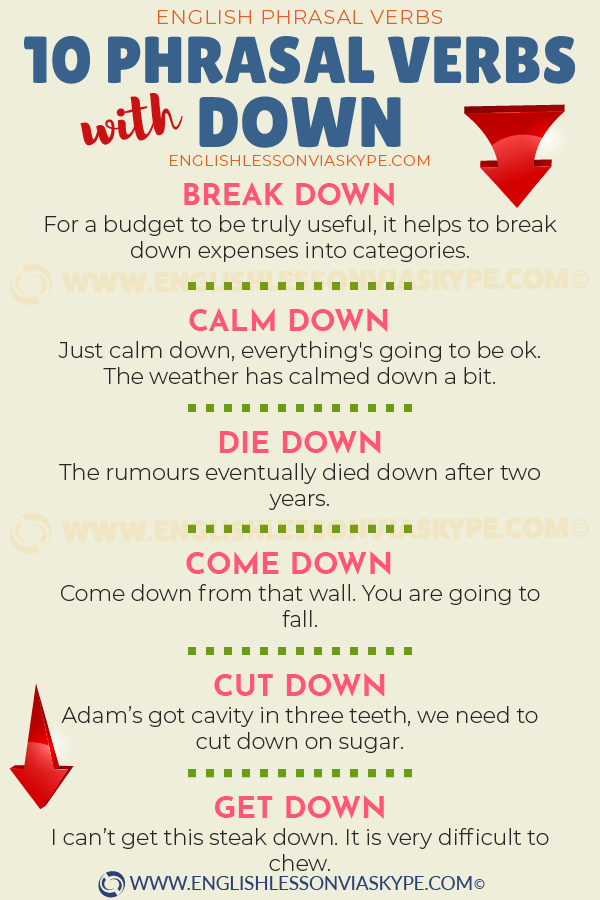
Share and help other students to improve English skills
I will also give you some examples and some exercises that you can practise yourself.So let’s move on so the first phrasal verb and I am going to cover in this particular section are those phrasal verbs with the preposition DOWN.
I’ve got a number of verbs that we’re going to use. The first one is TO BREAK DOWN.
When we look at and use break down, you can use it to talk about some calculation, some mathematical equation. You can also use it in any other situation, formal or informal, where you want to break down a letter into its individual paragraphs, where you want to break down any type of calculation formula, any booklet concerning numbers, statistics, everything connected with that.
BREAK DOWN also has another meaning. When we talk about to break down a wall, to break down barriers perhaps.
For example, we’re trying to break down the barriers that exist between different communities.
Or if you’re trying to do some repairs or renovation to your home, you might also be talking about breaking down some walls to create more open space in your apartment or your home.
10 Phrasal Verbs with Down
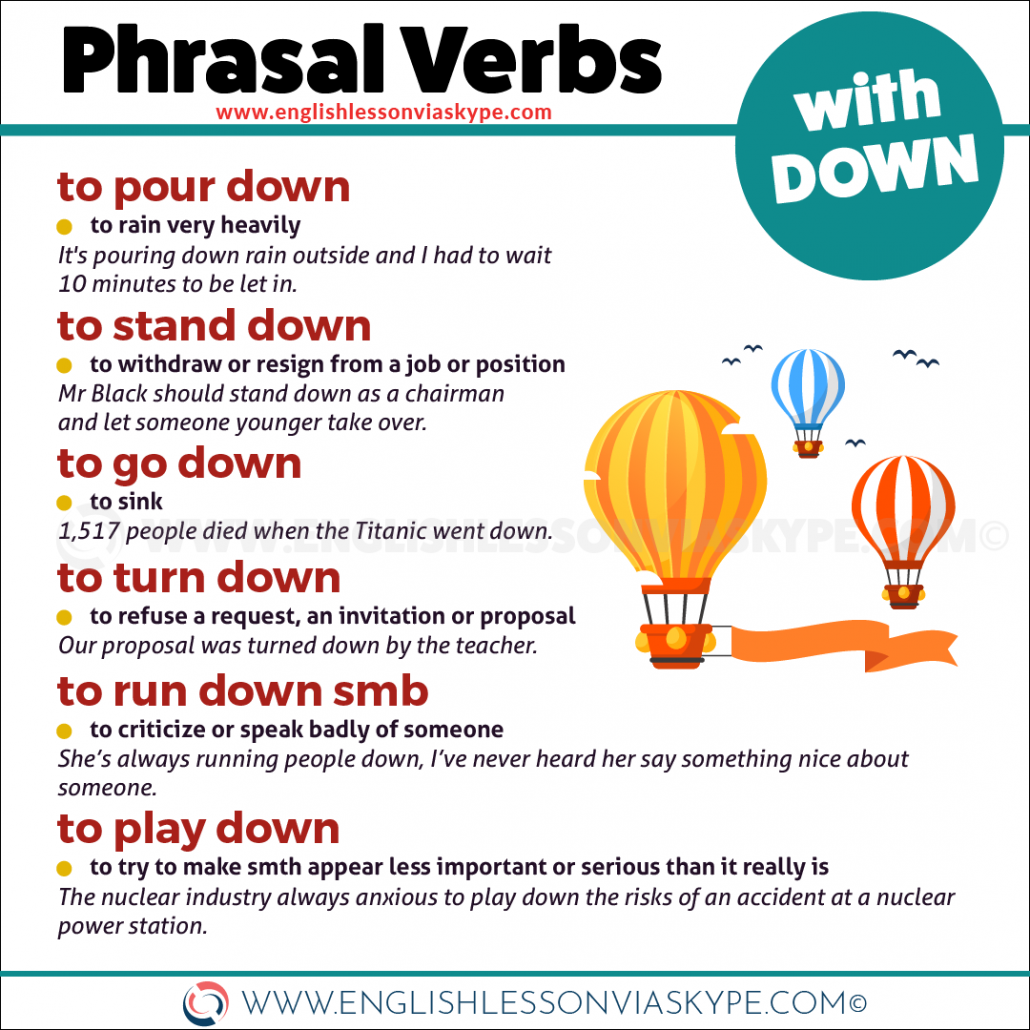
Next one TO CALM DOWN.
To calm down usually means to take things easy. Particularly we use to calm down when somebody’s getting very excited. They may be shouting and screaming. So a mother might say to a child:
Just calm down, take it easy we’ll talk about it. Everything is going to be okay.
So you’re trying to introduce an element of peace and quiet when somebody’s getting rather excited shouting and screaming. We ask them to calm down.
We can also use to calm down to describe the weather.
So there may have been a stormy night or day. Thunder, lightning, strong winds and when you come to the window, look out and you say:
Oh the weather has calmed down a little bit. We now only have a gentle breeze and there’s no further thunder or no further rain.
Next one TO COME DOWN
To come down is an instruction, an order, a command somebody might give to another person.
Please come down from that wall, you’re going to fall.
For example, a parent says to a child:
Come down at about eight o’clock and I’ll cook you dinner.
We can also say:
Come down to the city later on.
For example, if you’re living on a hill overlooking the city or some other place somebody you might say:
I’ll come down later on to the pub and I’ll buy you a drink.
10 Phrasal Verbs with Down
The next one is TO CUT DOWN
This as it says would suggest something being brought down in size, perhaps a tree or a fence or something that is no longer required.
He cut down the trees in his back garden so that there was more light coming in.
I will cut down that fence because it is certainly blocking out the light.
We can also use to cut down a slightly different way.
To cut somebody down means to try and get them away from being a little bit pompous or a little bit superior.
You might make a comment that will cut them down to size. Meaning make them feel a little bit smaller, a little bit like the rest of us rather than being pompous and overbearing.
He quickly made a comment that cut him down in size and everybody laughed.
The next one we have is TO DIE DOWN
To die down refers to situations where they may have been some trouble.
So we’ve been watching a lot of problems in Paris France where these yellow vests people have been protesting against various issues to do with the government and they have been blocking the streets, breaking windows and has been generally a situation of unrest.
However, after a period of days or weeks the unrest disappears, discussions take place and the heat of the situation dies down.
So when something dies down, it becomes lower or it reduces in its intensity.
Like a fire that you like to keep yourself warm during the winter. We build it up during the day, put plenty of wood or whatever we are using as a fuel and then as the evening gets late we let the fire die down.
There could be situation, rumours in the newspaper about some business that’s is in trouble or somebody that has been doing something they shouldn’t have been doing. But when the journalist digs further, there’s no information or no truth to the rumours and eventually those rumours die down or go away.
10 Phrasal Verbs with Down
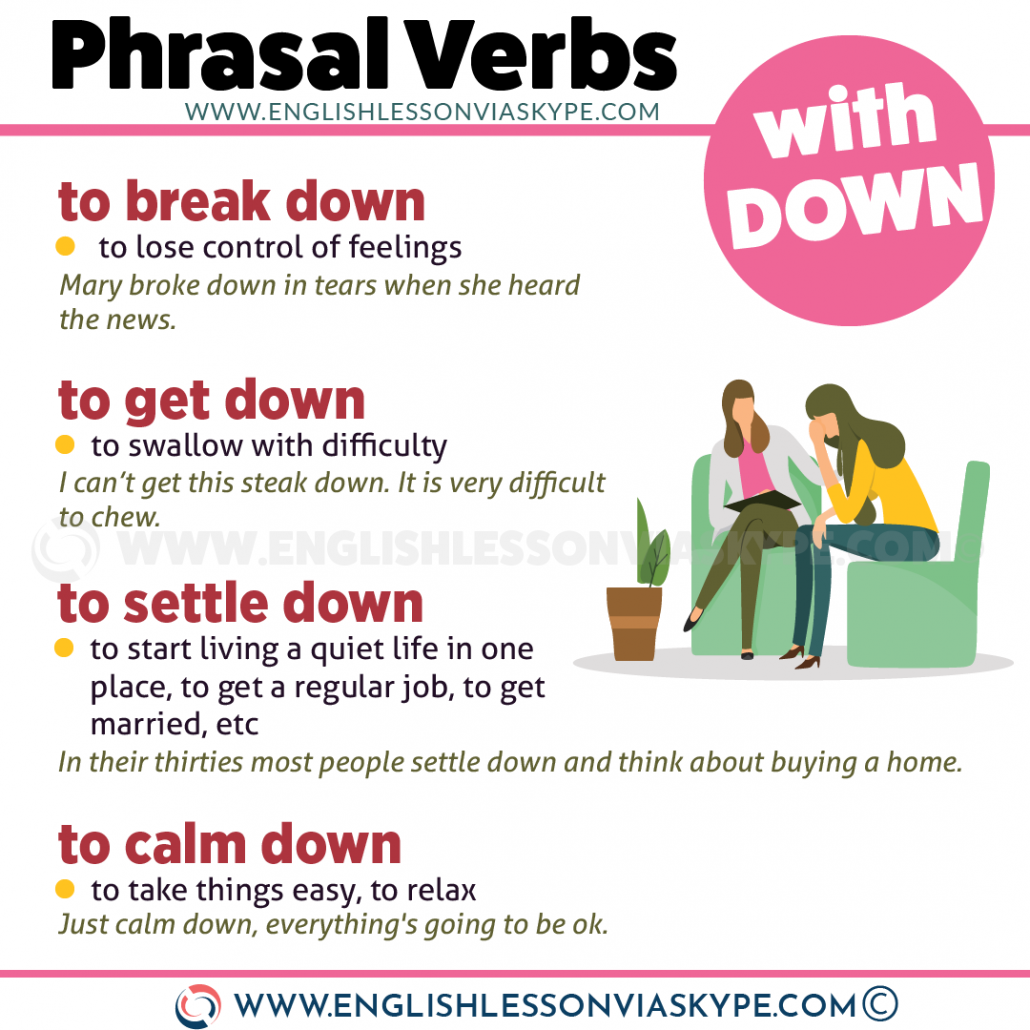
Share and help other students to improve English skills
Next one is TO GET DOWN
Again to get down is about some instructions so it’s usually said with a little bit of harshness in the voice.
Get down from that wall. Get down out of that tree.
A parent might insist that their son or daughter stop doing what they’re doing and get down immediately. So these are very strong or said in a strong way to give emphasis to the fact that it’s not really a request.
We can also use get down to instruct somebody else to do something that perhaps they don’t want to do.
Get down to your studies!
HOLD DOWN
Hold down means to stop something moving. You might be talking that say about a sport fixture, let’s say a rugby match which is very popular in the northern hemisphere particularly in those countries like Ireland England,Scotland, Wales and France where they play rugby to a high intensity.
During the rugby match one player held down another player and prevented him from releasing the ball.
Somebody might just ask you simply could you hold down something to stop it from moving.
Hold down that lid of the box whilst I tie some string around it.
We can also use hold down when we’re describing somebody who’s got a particular job. We mentioned that he’s been in this position for several years so we could say it quite informally:
He has held down a senior position in this company now for 10 years.
Meaning he’s well accepted, he is quite experienced and he has been in the company for some time, so he managed to hold down a job even though his bosses didn’t like him.
KEEP DOWN is the next one
To keep down can have several meanings. When we’re not feeling so well and we might be feeling nausea sand we might think we’re going to be sick, we might say to the doctor:
I find it very difficult to keep down food these days. Every time I eat I vomit. It’s always difficult for me to keep food down.
To keep down you can also use it again as an instruction.
In a war zone the captain or person in charge of the soldiers may shout an order to keep their heads down. To keep the heads down means to bend it sufficiently low not to make themselves a target for enemy and gunfire.
We can also say to keep your head down where when we’re talking metaphorically. It doesn’t literally mean to keep your head down but it means to keep out of trouble, not to let anybody notice.
My recommendation and advice to you is to keep your head down for a few months, just get on with the work and everything would be okay.
10 Phrasal Verbs with Down
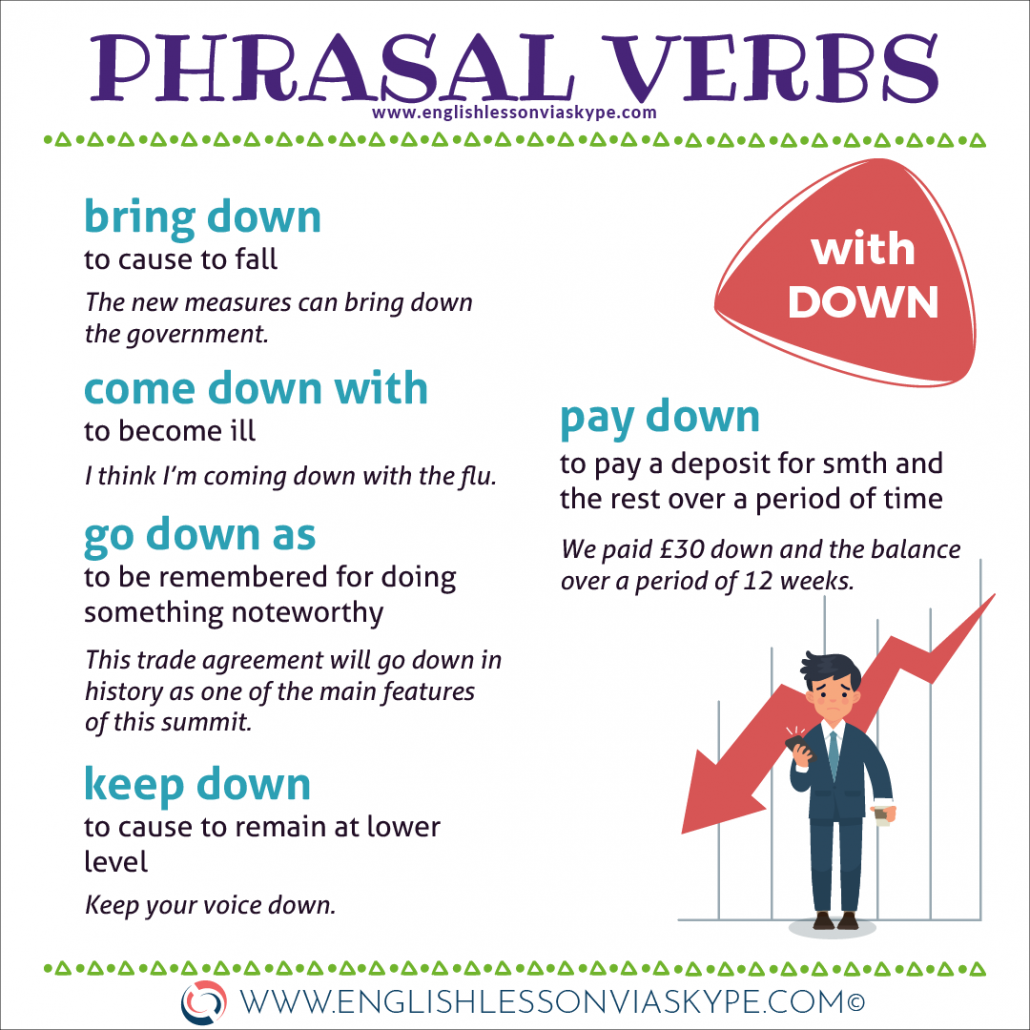
Share and help other students to improve English skills
TO LET DOWN is our next phrasal verb.
Let down again has a number of meanings.
You can be let down by a colleague or a friend or a family member. Meaning they have disappointed you. They promise to do something and at the last minute they didn’t follow through and you feel let down.
For example, you were hoping to go to the big rugby match or football match and your colleague said that he would be able to get you tickets. However, the day before the match you find out that he didn’t keep his promise. So he let you down.
Oh dear, you’ve really let me down. I promised my son that I would take him to this game.
We can also use to let down when we’re referring to clothes alterations.For example, your son has grown several centimetres and you need to make his trousers longer. So you take them to the the tailor and say:
Is there any chance you could let down the hem of these trousers? They are too short.
The last one in this particular section is TO SETTLE DOWN
So again settle down has a few different meanings. It can be used when somebody finally decides that their life is about the family or that job or the career, so they decide it’s time to settle down. Means to stop acting like young man, stop travelling around the world, stop changes jobs.
It’s time for you to settle down, get yourself a permanent job,think about getting married and make something of your life.
We can also use settle down as an instruction where the teacher in a classroom comes in and there’s a lot of noise before the beginning of the the class. The kids are a little bit excited so she says:
Come on, settle down. Time to get your books out and start the work.
Okay. So there’s a number of phrasal verbs with DOWN.
Join me again for the next section of my English phrasal verbs course. Thank you.
improve english on a budget
Online English Courses from €7.99
More Information
For more information on English idioms, phrasal verbs and English collocations, click on the links below:
You will love these English lessons
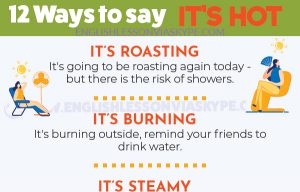
12 Other Ways to Say It’s Hot in English
Here you will learn 12 other ways to say it’s hot in English. Learn to describe hot weather in English


English Phrases Related to Relocation
Learn useful English phrases related to relocation and house moving. Read a short text and improve your English reading comprehension.


How To Say Happy In English
How to say happy in English. Different ways to say happy in English. Advanced English lessons on Zoom and Skype.

